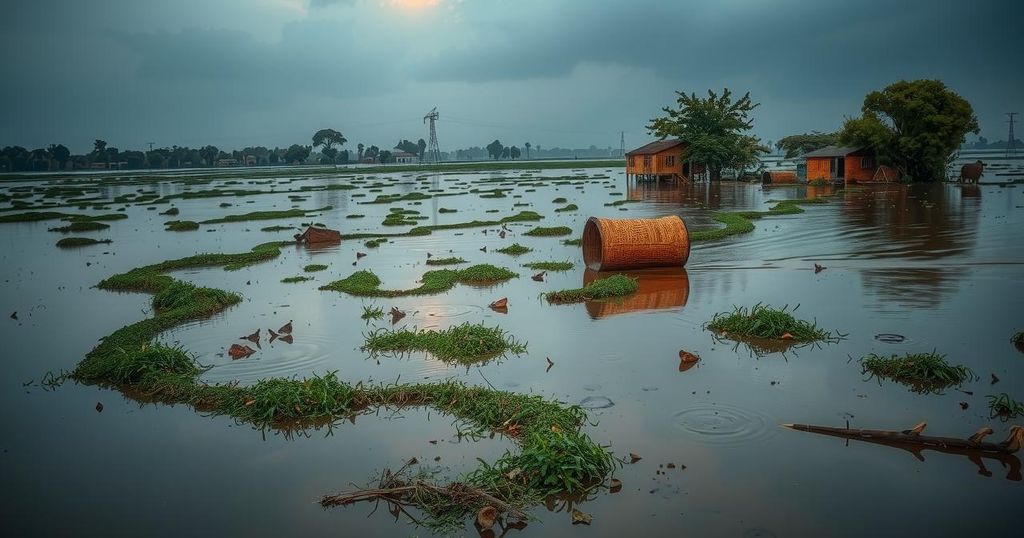Severe Flooding Heightens Health Crisis in South Sudan: WHO’s Response

Severe flooding in South Sudan has displaced over 226,000 people and affected 890,000 as health facilities become submerged and inaccessibility increases. The humanitarian crisis is compounded by rising diseases like cholera and malaria. The World Health Organization is mobilizing resources and collaborating with local authorities to deliver critical health services and support communities.
South Sudan is currently experiencing unprecedented flooding, which has resulted in widespread destruction across numerous regions, displacing more than 226,000 individuals and significantly impacting homes and livelihoods. Roadways and critical infrastructure have been submerged, leading to devastation in communities. The flooding has affected 42 out of the 78 counties in South Sudan, with 58 health facilities submerged, and nearly 90 others rendered inaccessible. Vital roadways, including those connecting to the capital, Juba, are cut off. As of October 4, 2024, approximately 890,000 individuals in flood-impacted areas have been affected. The rainy season, normally from April to November, has intensified in recent years due to climate change, exacerbating the communities’ resilience against natural disasters and leading to permanent displacement. The flooding has compounded an already critical humanitarian situation in South Sudan, which is home to nearly 800,000 refugees and returnees from armed conflicts in neighboring Sudan. There have been suspicious cholera cases identified in Renk County and a rise in malaria cases, surpassing 120,000, with recorded fatalities. Additionally, 55 incidents of snake bites have surfaced within a five-week span. Dr. Humphrey Karamagi, the World Health Organization (WHO) Representative in South Sudan, emphasized the heightened vulnerability of the population: “People are in a heightened state of vulnerability due to multiple shocks. WHO is committed to work with the Ministry of Health and our partners to ensure that they have access to essential health services continue while also prioritizing the response to growing humanitarian and health needs.” In response to the crisis, WHO has delivered approximately 88 metric tonnes of emergency health kits to critical areas such as Renk, Bentiu, Malakal, and Bor counties, which can treat over 870,000 people. These supplies include cholera treatment kits, antimalarial medications, and snakebite antidotes. Furthermore, since January 2024, the organization has distributed nearly 1,300 malaria kits nationally and prepositioned significant quantities of cholera rapid diagnostic tests. WHO collaborates with the South Sudan Ministry of Health to address this health emergency, including rapid assessments in affected areas and training local health workers to enhance emergency response capabilities. Amid ongoing efforts, WHO continues to monitor health impacts in flood-affected regions, focusing on vector-borne and waterborne diseases. The organization is also working towards building climate-resilient health systems capable of adapting to future health threats posed by climate change. Addressing climate-related health risks entails developing comprehensive legal, institutional, and operational frameworks. WHO advocates for sustainable investments that can fortify health systems against climate shocks, thus ensuring better protection for vulnerable communities in South Sudan.
The flooding currently affecting South Sudan is part of a broader pattern of extreme weather exacerbated by climate change, leading to more severe natural disasters that impact humanitarian efforts. Flooding during the rainy season has always presented challenges, but the current scale of displacement and health risks is unprecedented. Refugee and returnee populations fleeing conflicts in neighboring Sudan are also contributing to an already fragile situation.
The catastrophic flooding in South Sudan has overwhelmed the country’s already precarious health and humanitarian systems, displacing hundreds of thousands and increasing health risks. With WHO’s committed response, distribution of emergency health supplies, and focus on building resilience against climate impacts, there is a concerted effort to mitigate the ongoing health crisis and address the urgent needs of affected populations.
Original Source: www.afro.who.int






